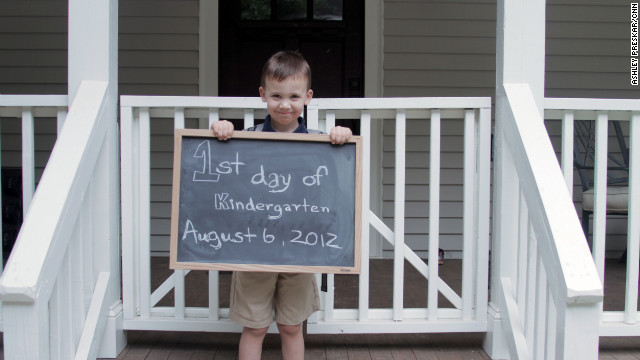For our teenagers!
______________________________________
BIRTHDAY INTERVIEW!!!
Love this idea. It's a Birthday interview for children. I'm going to start this and save them all. Will be amazing to go back and read them all :)
_______________________________________
Take a look at this great chart, very helpful in the way we approach our children!!!!!
7 Back to School Backpack Safety Tips
With school being back in session, below is a great article with tips for parents from medicaldaily.com. I wanted to share with you all and hope that you will read and educate your children about the safety of backpacks and how to use them.
___________________________________________________________________________________
It's that time of year, first day of school!!!!!
For parents and children it's a very special day, especially if they're little angels are starting Kindergarden this year. To celebrate this milestone and commemorate this unforgettable day,
we bring you some UNIQUE ideas of capturing the moments forever.
______________________________________________________
Reminder to parents the importance of Water Safety, after Usher's Son nearly drowns.
Scary news out of Atlanta today - Usher's son, Usher Raymond V, was rushed to the hospital after a pool accident at the singer's home.
The five-year-old was apparently playing in the pool on Monday night when he saw a toy in the drain. He dove under the water to retrieve it and got stuck.
TMZ reports that his aunt jumped in to rescue him but couldn't get his hand out. A maid was also unable to get him out. Finally, two male employees working in the house came out and were able to free the boy.
The child, who is the son of Usher and his ex-wife Tameka Foster, was taken to the hospital where he is expected to make a full recovery.
We are SO thankful that this story has a happy ending, but it also serves an important reminder to parents everywhere that you can't be too careful when it comes to kids and water.
Here are some water safety tips from PoolSafely.gov:
- Never leave a child unattended in a pool or spa and always watch your child when he or she is in or near water
- Teach children basic water safety tips
- Keep children away from pool drains, pipes and other openings to avoid entrapments
- Have a telephone close by when you or your family is using a pool or spa
- If a child is missing, look for him or her in the pool or spa first
- Share safety instructions with family, friends and neighbors
- Learn to perform CPR on children and adults, and update those skills regularly
- Understand the basics of life-saving so that you can assist in a pool emergency
_____________________________________________________
10 THINGS I KNOW HOW TO DO BECAUSE I'M A MOTHER!!!!
100 Things to do this Summer!!!
Summer Safety Checklist!!!
Since Summer is here, wanted to share this Summer Safety Checklist with you all. Have a safe and unforgettable Summer of 2013!!!
__________________________________________________________________________________
Are kids getting enough sleep?
Is your little one getting enough shut-eye? According the sleep experts, the answer is probably no.
After reviewing 100+ years of studies about children and sleep -- more than 300 of them -- University of South Australian researchers determined that sleep experts have consistently found that children got less sleep than recommended, Time Magazine reported.
“Over the 112 years the study covered, children lost about 75 minutes of shut-eye,” Time’s Bonnie Rochman wrote of the new study inPediatrics, “in 1897, experts were recommending that kids sleep 1 hr. 15 min. more than was advised in 2009.”
“Another constant,” Rochman added, “societal hand-wringing over children’s lack of sleep and a tendency to blame the hectic pace of modern life.” One of the study’s authors said, “People are always recommending kids sleep more than they do.”
So what's the current recommended amount of sleep time for children?
It varies based on age, but according to the National Sleep Foundation babies between the ages of 3 to 11 months need a total of 14 to 15 hours, while toddlers between 1 to 3 years old should get 12 to 14 hours. Preschoolers need 11 to 13 hours, and elementary schoolers should sleep between 10 to 11 hours. Older children and teens need a minimum of 8½ hours.
 How many hours of sleep do your kids normally get?
How many hours of sleep do your kids normally get?
How many hours of sleep are your kids getting?
_________________________________________________________________________________
WORDS FOR MOM!!!
Sometimes it’s hard to find the words to express just how awesome moms are. Let us do it for you with these quotes from those who said it best.
________________________________________
Do you have a Mom Intuition???
Women do have a sixth sense and it becomes extremely acute after a woman gives birth. From my twenty years of practice I have observed that most woman do not trust their intuition and spend too much time pushing it away rather than listening to it.
____________________________________________________
Here's a great idea for children's bedtime routine!!!!
_______________________________________
______________________________________
BIRTHDAY INTERVIEW!!!
Love this idea. It's a Birthday interview for children. I'm going to start this and save them all. Will be amazing to go back and read them all :)
_______________________________________
Take a look at this great chart, very helpful in the way we approach our children!!!!!
7 Back to School Backpack Safety Tips
With school being back in session, below is a great article with tips for parents from medicaldaily.com. I wanted to share with you all and hope that you will read and educate your children about the safety of backpacks and how to use them.
___________________________________________________________________________________
It's that time of year, first day of school!!!!!
For parents and children it's a very special day, especially if they're little angels are starting Kindergarden this year. To celebrate this milestone and commemorate this unforgettable day,
we bring you some UNIQUE ideas of capturing the moments forever.
______________________________________________________
Reminder to parents the importance of Water Safety, after Usher's Son nearly drowns.
Scary news out of Atlanta today - Usher's son, Usher Raymond V, was rushed to the hospital after a pool accident at the singer's home.
The five-year-old was apparently playing in the pool on Monday night when he saw a toy in the drain. He dove under the water to retrieve it and got stuck.
TMZ reports that his aunt jumped in to rescue him but couldn't get his hand out. A maid was also unable to get him out. Finally, two male employees working in the house came out and were able to free the boy.
The child, who is the son of Usher and his ex-wife Tameka Foster, was taken to the hospital where he is expected to make a full recovery.
We are SO thankful that this story has a happy ending, but it also serves an important reminder to parents everywhere that you can't be too careful when it comes to kids and water.
Here are some water safety tips from PoolSafely.gov:
- Never leave a child unattended in a pool or spa and always watch your child when he or she is in or near water
- Teach children basic water safety tips
- Keep children away from pool drains, pipes and other openings to avoid entrapments
- Have a telephone close by when you or your family is using a pool or spa
- If a child is missing, look for him or her in the pool or spa first
- Share safety instructions with family, friends and neighbors
- Learn to perform CPR on children and adults, and update those skills regularly
- Understand the basics of life-saving so that you can assist in a pool emergency
_____________________________________________________
10 THINGS I KNOW HOW TO DO BECAUSE I'M A MOTHER!!!!
100 Things to do this Summer!!!
Summer Safety Checklist!!!
Since Summer is here, wanted to share this Summer Safety Checklist with you all. Have a safe and unforgettable Summer of 2013!!!
__________________________________________________________________________________
Are kids getting enough sleep?
Is your little one getting enough shut-eye? According the sleep experts, the answer is probably no.
After reviewing 100+ years of studies about children and sleep -- more than 300 of them -- University of South Australian researchers determined that sleep experts have consistently found that children got less sleep than recommended, Time Magazine reported.
“Over the 112 years the study covered, children lost about 75 minutes of shut-eye,” Time’s Bonnie Rochman wrote of the new study inPediatrics, “in 1897, experts were recommending that kids sleep 1 hr. 15 min. more than was advised in 2009.”
“Another constant,” Rochman added, “societal hand-wringing over children’s lack of sleep and a tendency to blame the hectic pace of modern life.” One of the study’s authors said, “People are always recommending kids sleep more than they do.”
So what's the current recommended amount of sleep time for children?
It varies based on age, but according to the National Sleep Foundation babies between the ages of 3 to 11 months need a total of 14 to 15 hours, while toddlers between 1 to 3 years old should get 12 to 14 hours. Preschoolers need 11 to 13 hours, and elementary schoolers should sleep between 10 to 11 hours. Older children and teens need a minimum of 8½ hours.

How many hours of sleep do your kids normally get?
How many hours of sleep are your kids getting?
_________________________________________________________________________________
How many hours of sleep are your kids getting?
_________________________________________________________________________________
WORDS FOR MOM!!!
Sometimes it’s hard to find the words to express just how awesome moms are. Let us do it for you with these quotes from those who said it best.
________________________________________
Do you have a Mom Intuition???
Women do have a sixth sense and it becomes extremely acute after a woman gives birth. From my twenty years of practice I have observed that most woman do not trust their intuition and spend too much time pushing it away rather than listening to it.
____________________________________________________
Here's a great idea for children's bedtime routine!!!!
NEW YEAR’S RESOLUTIONS FOR MOMS AND DADS!!!
Here are some New Year's Resolutions that are recommended for Moms and Dads.
Are any of these on your list?
Spend more time with your children. Research shows that children who feel connected to their parents develop better self-esteem and experience less emotional distress.
Show affection. By showing your children they are loved, you are telling them they are an important part of your life.
Keep your promises. Promise only what you know you can deliver. Let it be something meaningful to your child, like spending time together. Follow through on your promises.
Be in touch with your emotions. You teach your child through your actions. Gather your emotions and show your children it is always important to act in a respectful manner when interacting with others, no matter how difficult the situation.
Become a better listener. Take time to listen to your children’s ideas and problems. Often, parents can do too much talking and not enough listening, particularly when children have done something wrong. Allow your children the chance to explain their understanding of a situation. And then listen.
Discipline with love. Children need guidance and discipline, not as punishment but to set reasonable limits. Remind your children of the consequences of their actions and provide meaningful rewards for good behavior.
Be a good role model. By teaching your children right and wrong and encouraging them to do their best, you help them make good choices.
Get involved in your child's school life. Attend parent/teacher meetings. Help with homework. Check for school notices and information. Ask your children how school is going. Know the names and personalities of your children’s teachers and friends.
Connect with other parents. Create a network of parents who you can talk to and share the trials and tribulations of parenthood. Parents naturally have a common bond from shared experiences. Keep your sense of humor and be open to new ideas.
Take the best possible care of your children. Watch what your children eat, keep them active, and make sure they get enough sleep. The same goes for parents! It is easier to tackle the stresses of being a parent when you feel healthy.
Are any of these on your list?
Spend more time with your children. Research shows that children who feel connected to their parents develop better self-esteem and experience less emotional distress.
_____________________________
Talking to Your Children About School Shootings
In the wake of the tragic school shooting in Connecticut, parents all over the country may be wondering how to talk to their children about the news.
Kids are like little sponges, they take in much more than we realize and it's important to address any fears and concerns they may have. "Am I safe? Who would do such a thing? Why? Will it happen at my school? "
There are no easy answers. It's hard to explain how something so terrible could happen - especially when we're still trying to make sense of it ourselves.
So for parents who need some guidance, here are some basic tips from the National Mental Health Association:
1. Encourage children to express their concerns and talk about their feelings. Some may be hesitant to bring it up, so start the conversation by letting them know you are interested in how they are coping with the information they are getting.
2. Validate their feelings. Listen to what they are saying and don't interrupt. Don't minimize or dismiss their concerns.
3. Reassure children that they are safe. Stress that schools are not dangerous places. In fact, recent studies have shown that schools are more secure now than ever before.
4. Review safety procedures. Explain why visitors sign in at the school office or certain doors stay locked during the school day.
5. Create a safety plan. Help children develop their own action plan and identify at least one adult at school and in the community to whom they go if they feel threatened or at risk. Also ensure that your child knows how to reach you in case of an emergency during the school day.
6. Watch your child for signs of distress. Parents should be alert to any signs of anxiety that might suggest that a child or teenager might need more assistance. Such indicators could be "a change in the child's school performance, changes in relationships with peers and teachers, excessive worry, school refusal, sleeplessness, nightmares, headaches or stomachaches, or loss of interest in activities that the child used to enjoy."
7. Don't be afraid to ask for help. If you are worried about your child’s reaction to the news or have concerns about his/her behavior or emotions, contact a mental health professional.
And last but not least...
Give your little one a hug. Tell your children how much you love them. And say a little prayer for the parents in Connecticut who won't be able to hug their children tonight. We are deeply saddened by their loss.
____________________________________________________
Five ways to make every child feel special
Children love attention especially from their parents. Study shows that children perform better in schools, feel happier and complete if they spend quality time with their parents.
Finding ways to make every child feel special isn’t always easy. Use these five tips to engage with your children and make each of them feel special today and everyday.
1. PUT AWAY YOUR CELL PHONE.
When your child gets home from school or an extracurricular activity, chances are he/she will want to share their experiences with you. If you're caught up in emailing, texting or talking on the phone, you may lose your window of opportunity to engage with your child. When they first walk through the door, put away your cell phone and sit down with them for at least 10 to 15 minutes. Look at him/her in the eye, ask questions and really engage with him/her as you discuss their day.
2. PLAN PARENT-CHILD DATES.
At least once a month, set aside a day to bond with your child. If you have several kids, make sure they each get their own special days. The amount of time you set aside depends on the child and the activities you plan, but make sure to involve your child in the planning process. If one of your children is a history or art buff, plan a trip to your local museum. If you're the parent of a sports fanatic, hit the batting cages together. If your child loves to bake, spend the day in the kitchen or at a cooking class. The point is to engage with your child while supporting and sharing her interests.
3. CELEBRATE SPECIAL ANNIVERSARIES.
Most kids feel special on their birthdays, but remembering and commemorating other landmark occasions will help him/her build a history of personal traditions. These special anniversaries could be as simple as a half-birthday celebration exactly six months after his/her birthday, or they could be more significant, like the anniversary of their recovery from a major injury or illness. These celebrations don't need to be large; just a card or a bouquet of flowers is all it takes to say, "I love you and I remembered."
4. ASK FOR HELP.
Kids love knowing that their presence and input is important. Ask your children to help plan special events or to provide input on major family purchases and decisions. Your children will feel special knowing you love and respect their opinions, and this will allow their confidence to grow.
5. DON'T FORGET THE HUGS
Physical bonding between parents and children carries importance throughout life. Create routines that involve hugging, kissing and hair tousling. For instance, give a hug and kiss every morning before your child leaves for school, and then again before he/she goes to bed at night. Pat them on the back when they get home for the day, and tousle their hair or rub their shoulder every time you walk past. The more they know you're there for them physically and emotionally, the more secure and special they'll feel.























No comments:
Post a Comment